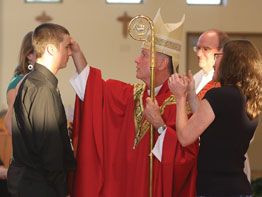IJAMSVILLE – Without uttering a word, nine teens from Central Maryland conveyed their love for their church using signs and gestures during a first-ever archdiocesan confirmation liturgy for the deaf community May 13.
Standing in a sanctuary festooned with crimson banners at St. Ignatius in Ijamsville, Bishop W. Francis Malooly, western vicar, conferred the sacrament by anointing the forehead of each candidate with chrism oil while an interpreter stood by his side and translated his words into signs.
Holding his crosier, the bishop signed the words, “peace be with you,” and offered a greeting to each young person.
In his homily, Bishop Malooly urged the young people to pray every day and to use their talents in service of others.
“I communicate with words,” said Bishop Malooly. “You communicate with sign. But we both communicate with our faces. Be the face of Jesus for others.”
Bishop Malooly got to know many of the teens when he accompanied them on the youth and young adult pilgrimage in Baltimore March 15.
In the past, members of the deaf community were confirmed with hearing candidates. Because there was a large group of deaf Catholics who received the sacrament of Holy Eucharist several years ago, Bishop Malooly gave permission to hold a special confirmation liturgy just for the deaf. The teens, ranging in age from 13-16, came from several parishes in the region.
Because the Maryland School for the Deaf is located in Frederick, Central Maryland has a large population of deaf Catholics. Throughout the Archdiocese of Baltimore, there are approximately 2,000 deaf Catholics, according to Eileen Colarusso, archdiocesan coordinator of deaf ministry.
“The kids were very excited and surprised that the bishop took the time to learn some of the language,” said Ms. Colarusso. “Any gesture like that is very much appreciated.”
Michael Tota, a 16-year-old parishioner of St. Ignatius and a junior at the Maryland School for the Deaf, said he was happy to receive the sacrament and pleased to meet the bishop. He chose “Cyril” as his confirmation name, he said, because St. Cyril was a defender of the faith.
Speaking through a translation provided by Ms. Colarusso, Michael said it’s important for parishes to provide interpreters to make everyone feel included.
“When there’s not an interpreter at Mass, we can’t understand what’s going on, and then we don’t go to church,” he explained.
There are 20 parishes that currently have interpreters, according to Ms. Colarusso. Father Michael Carrion, pastor of Immaculate Heart of Mary in Baynesville, is the only archdiocesan priest who knows sign language. A deaf priest recently worked in Central Maryland until being reassigned. There are no deaf priests who sign ministering in the archdiocese.
Michael said there is a real need for more deaf priests – an observation seconded by Lauren Goldberg, a 13-year-old parishioner of St. Ignatius and a seventh-grader at the Maryland School for the Deaf.
“I notice that more deaf people come to Mass when there’s a deaf priest there,” said Lauren, who chose the name “Zita” for her confirmation name in honor of a relative.
Ms. Colarusso urged more people to become interpreters.
“It’s a challenge because the language of the liturgy is very different from how you normally speak,” she said.
Bishop Malooly told The Catholic Review seminarians are encouraged to study sign language, but he acknowledged that with their many demands it is often difficult for them to do it. Ms. Colarusso also holds training workshops on sign language in the liturgy.
For more information about ministry to the deaf, contact Ms. Colarusso at 410-547-5344.


